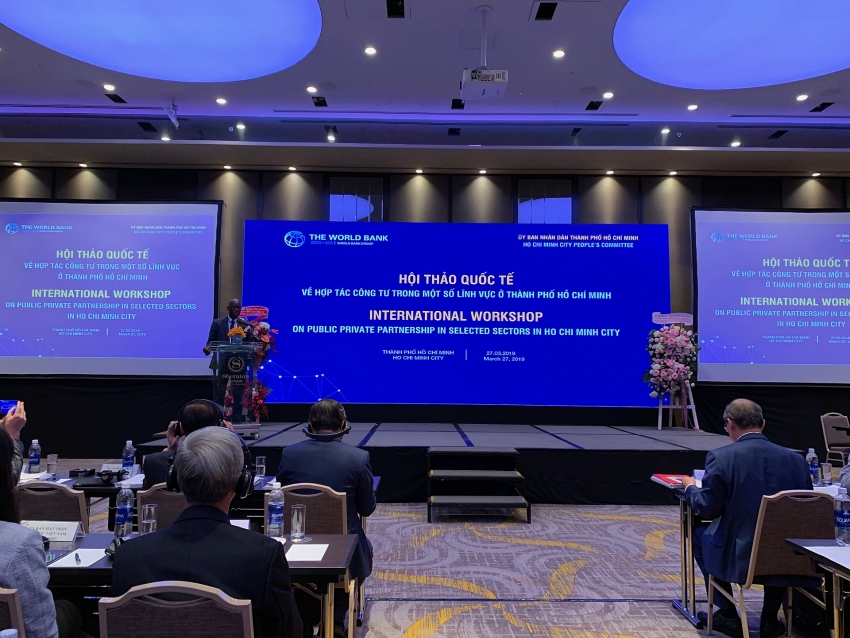Ho Chi Minh City calls for Public Private Partnership investment
The Public Private Partnership (PPP) seminar held by the Ho Chi Minh City Department of Planning and Investment in collaboration with the World Bank, is attended by representatives of the Ministry of Planning and Investment and many other ministries, the World Bank in Vietnam, the Asian Development Bank, JICA, Ho Chi Minh City Finance and Investment State-Owned Company, foreign embassies and consulate offices to Vietnam, the European Chamber of Commerce in Vietnam, and many international consultancy firms such as KPMG Vietnam, Deloitte Vietnam, PWC Vietnam, as well as representatives from educational institutions, hospitals, and medical centres.
 |
| Ousmane Dione, country director of the World Bank in Vietnam, highlighted that all levels of government, people, and the private sector should recognise that they are sharing not only the benefits but the risks of PPP investment |
Key issues discussed in the seminar are solutions for the effective use of the state budget, international experiences on investment under the Public Private Partnership (PPP) form, and strategies to mobilise private capital for infrastructure development and service provision in healthcare, education, solid waste treatment, wastewater treatment, and flood control.
Other related issues touch upon the constraints within the relevant legal and regulatory frameworks to promote PPP investment efficiency and strategies to improve private sector participation in service provision and infrastructure development across these four fields.
Speaking at the seminar, Ousmane Dione, country director of the World Bank in Vietnam, said that to create a successful PPP model, all sides should recognise the model’s long-term nature whereby public and private stakeholders share not only the interests but also the risks.
“For many partnerships without a balanced sharing of risks and interests, failure will be a very likely outcome, thus PPP must become a partnership model in which each and every stakeholder has their benefits,” Dione said.
He added that the legal, regulatory, and institutional framework must be clear to facilitate investors to accept long-term risks with the expectation to rely on these legal and institutional frameworks.
In additional to the sharing of international experiences on the mobilisation of social capital and promotion of PPP, there was also a debate session on the privatisation of investment in solid waste treatment, wastewater treatment, and flood control, as well as healthcare and education.
According to the Ho Chi Minh City Department of Planning and Investment, to complete the city’s five-year socioeconomic development plan (2016-2020), the total investment capital demand from the budget from 2016 to 2020 is VND326.556 billion ($14.2 billion). Meanwhile, the state can only allocate VND171.895 billion ($7.5 billion), which is 52 per cent of the investment demand.
What the stars mean:
★ Poor ★ ★ Promising ★★★ Good ★★★★ Very good ★★★★★ Exceptional
Related Contents
Latest News
More News
- EU and Vietnam elevate relations to a comprehensive strategic partnership (January 29, 2026 | 15:22)
- Vietnam to lead trade growth in ASEAN (January 29, 2026 | 15:08)
- Japanese business outlook in Vietnam turns more optimistic (January 28, 2026 | 09:54)
- Foreign leaders extend congratulations to Party General Secretary To Lam (January 25, 2026 | 10:01)
- 14th National Party Congress wraps up with success (January 25, 2026 | 09:49)
- Congratulations from VFF Central Committee's int’l partners to 14th National Party Congress (January 25, 2026 | 09:46)
- 14th Party Central Committee unanimously elects To Lam as General Secretary (January 23, 2026 | 16:22)
- Worldwide congratulations underscore confidence in Vietnam’s 14th Party Congress (January 23, 2026 | 09:02)
- Political parties, organisations, int’l friends send congratulations to 14th National Party Congress (January 22, 2026 | 09:33)
- Press release on second working day of 14th National Party Congress (January 22, 2026 | 09:19)

 Tag:
Tag:





















 Mobile Version
Mobile Version